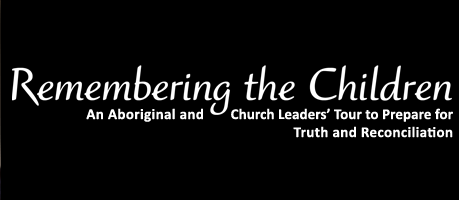

You are here:
The Presbyterian Church in Canada Addressing Issues of Aboriginal Rights and the Legacy of the Residential Schools
Highlights from 1992-2005
Today, The Presbyterian Church in Canada continues to pursuing a path of healing and reconciliation with Aboriginal peoples, particularly those who bear the scar of having attended one of the schools run by the PCC.
Following the presentation of a "confession" in 1992 by the Board of World Mission, the 118th General Assembly approved recommendations including, "that the church support healing processes that arise from Aboriginal peoples themselves," and that the church commit itself to seeking ways to work with Aboriginal peoples in calling the Government of Canada to acknowledge that its policies were harmful to Aboriginal peoples. The following is a summary of some of the steps that have been taken since that date in this healing process:
Royal Commission on Aboriginal Peoples
In 1992, representatives of the Women’s Missionary Society (WMS), Canada Ministries and Justice Ministries attended a meeting with the Royal Commission on Aboriginal Peoples. Ray Hodgson, at that time Associate Secretary for Justice Ministries, presented a paper on behalf of the PCC.
Meetings with Iskutewisakagun No. 39 Independent First Nation (Shoal Lake)
Meetings were held with representatives from Iskutewisakagun No. 39 Independent First Nation (Shoal Lake), and the Assembly of Manitoba Chiefs. A proposal was presented to the Assembly Council around a healing initiative. This initiative was not followed up because of changes in the leadership at Iskutewisakagun No. 39 Independent First Nation.
Residential Schools Working Group
The Residential School Working Group (RSWG), made up mainly of staff of the national church and housed at church offices in Toronto, Ontario, was formed as a committee of the Assembly Council in November 1993. Representation on the committee includes staff from the Archives, Life and Mission Agency, Women's Missionary Society (WMS), Resource Production and Communications, and Assembly Council. The RSWG developed terms of reference, which included monitoring the ongoing situation with respect to residential schools operated by the PCC, and monitoring the report of the Royal Commission as it applies to the issues of residential schools. Their work was also to include negotiating as necessary with other denominations involved in residential schools, and with the federal and provincial governments involved. The Rev. Stephen Kendall, Principal Clerk of the General Assembly, and Ian Morrison, General Secretary of the Life and Mission Agency (until his retirement in 2005) spent many hours at meetings with representatives from the Government of Canada, the other church entities involved with residential schools and Aboriginal representatives in negotiations that led to the signing of the IRS Settlement Agreement.
Saskatoon Consultation with Aboriginal People
In January 1993 in Saskatoon, the Consultation on Church and Society held a very important event. Occurring after the confession was referred back, this event enabled Aboriginal peoples to voice their opinions.
The Confession of 1994
In 1994, the 120th General Assembly adopted "The Confession of The Presbyterian Church." It was presented to First Nations peoples at the Forks National Site in Winnipeg on October 8, 1994. Present, among others, were Dr. George Vais, Moderator of the 120th General Assembly; Kay Cowper, then President of the WMS; Tamiko Corbett, Executive Secretary of the WMS at that time; and Rev. Thomas Gemmell, then Principal Clerk of the General Assembly. In a ceremony combining Native and Christian traditions, Grand Chief of the Assembly of Manitoba Chiefs Phil Fontaine accepted the confession on behalf of First Nations peoples. Chief Fontaine remarked that while he was willing to accept the confession he still could not forgive the church for what was done. He indicated that the confession however was an important step towards healing.
Sacred Assembly
Representatives from the church participated in the Sacred Assembly headed by Elijah Harper in December 1995 in Hull Quebec. Ray Hodgson and the then moderator Rev. Allan MacPherson spoke on behalf of the PCC. Bishop Gordon Beardy, then Anglican Bishop of the Diocese of Keewatin, was an ecumenical guest at the 1999 General Assembly.
Documentary on Residential School
In 1999, Keith Knight, Associate Secretary of Resource Production and Communications, joined the working group. Keith brought the information on how The PCC along with the Canadian Council of Catholic Bishops, the Anglican Church and the United Church were discussing a communications strategy. One result was a two-part documentary: Residential Schools: Moving Beyond Survival, a first-time collaboration between Vision TV, CBC Newsworld and APTN, and aired on Vision television network. Following broadcast, the production was repackaged by Interchurch Communications into a four-part video series, which could be used by congregations. Keith, June Stevenson and Cam Steele, member of the Assembly Council, attended the taping of the videos.
Gathering of Former Residential School Workers
A gathering for former residential school workers was held in Winnipeg April 12-13, 2002. This was an opportunity to recognize and to celebrate their ministry. The Moderator of the General Assembly, Joe Reed, and WMS President Joanne Instance attended this gathering
Journey to Wholeness
Assembly Council approved a Healing Fund Campaign, Journey to Wholeness, in March 1996. The RSWG drew up the terms of reference and target for the fund. A working group was authorized to seek voluntary contributions according to the guidelines established by the 1995 Assembly with a goal of $250,000. About $283,000 was realized.
Contributions came from individuals, groups and congregations across Canada. The Women’s Missionary Society which administered the residential schools gave a one-time grant of $30,000. An initial amount of $95,007, set aside for the “Healing Process” was transferred to this fund by the General Assembly.
A committee was formed and a part time coordinator was hired. Promotional and educational materials including a video were produced. The costs for the coordinator and the committee expenses amounted to $86,000.
In 2000, a spending committee began its work with a balance of Native and non-Native members. Their first task was to set up criteria for grants and produce a brochure. The brochure was distributed widely especially in areas where there was Native work. There was $197,000 in funds to be distributed. Thirteen different projects were funded from these monies before the campaign and the fund was closed in 2004.
Meeting of Native Ministries Committee and the Executive of the Assembly Council
Over the years the work of the Residential Schools Working Group shifted slightly from a monitoring group to being somewhat more proactive in enabling healing and reconciliation to occur in areas across Canada. In the spring of 2001, RSWG members joined the National Native Ministries Committee, a committee of Canada Ministries, for most of its three-day meeting. In order to highlight the work of these two groups, members of the Assembly Council were present for a time of sharing and fellowship. It was the first time some of this committee had encountered first hand the stories of native people, and taken part in traditional native spiritual practices. The setting for this gathering was the Manitoba Korean Presbyterian congregation in Winnipeg which is home to the first Korean missionary sent by the Presbyterian Church in Korea to minister to Canada's Aboriginal people.
Healing and Reconciliation Task Force
This Task Force was appointed by the Assembly Council in 2004 and worked for two years. During that time an extensive consultation process took place in the form of a series of sharing circles in Vancouver, Saskatoon, Winnipeg, Kenora, Sarnia and Moncton. An educational resource person was hired on a half-time basis and resources for the church were created. This group made a series of recommendations to the Assembly Council in 2005 including recommendations in support of National Aboriginal Day and the National Day of Healing and Reconciliation.
Healing and Reconciliation Sharing Circles at 2005 General Assembly
During the evening sederunt on Tuesday 7th June, 2005 the General Assembly divided into 10 sharing circles in which individuals were invited to tell their own stories as they related to living and working with Aboriginal people. This was a great success and left people open to a future of greater participation in cross cultural relationships.